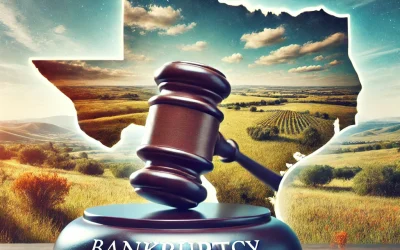Table Of Contents
- 1 Bankruptcy Basics With Tyler Texas Bankruptcy Lawyer Howard Tagg
- 2 The Purposes of Filing for Bankruptcy:
- 3 What Exactly Is A Bankruptcy Anyway?
- 4 To align with bankruptcy basics, lets talk about what Bankruptcy really is. Bankruptcy is a legal process designed to help individuals and businesses struggling with debt achieve financial relief. It serves two main purposes:
- 5 Types of Bankruptcy for Individuals and Small Businesses
- 6 Chapter 7 Bankruptcy: Liquidation & Debt Discharge
- 7 Chapter 13 Bankruptcy: Debt Reorganization Plan
Bankruptcy Basics With Tyler Texas Bankruptcy Lawyer Howard Tagg
The Purposes of Filing for Bankruptcy:
Bankruptcy serves two main purposes:
- Bankruptcy may give creditors some payment on their debts
- Bankruptcy gives you a fresh start by canceling many of your debts through an order of the court called a discharge
What Exactly Is A Bankruptcy Anyway?
To align with bankruptcy basics, lets talk about what Bankruptcy really is. Bankruptcy is a legal process designed to help individuals and businesses struggling with debt achieve financial relief. It serves two main purposes:
- Debt Relief for Consumers and Businesses – Bankruptcy allows individuals and small businesses to eliminate or restructure overwhelming debt, providing a fresh financial start.
- Creditor Compensation – While bankruptcy prioritizes the protection of consumers, it also ensures creditors receive payment where possible, depending on the type of bankruptcy filed.
Types of Bankruptcy for Individuals and Small Businesses
For the purpose of giving you the bankruptcy basics, we’re going to stick to the two options that are most common in Tyler Texas. There are two primary types of bankruptcy that individuals and businesses can file under the U.S. Bankruptcy Code through our office:
- Chapter 7 Bankruptcy – A liquidation bankruptcy where non-exempt assets may be sold to pay creditors, and most remaining debts are discharged.
- Chapter 13 Bankruptcy – A reorganization bankruptcy for individuals with regular income, allowing them to repay debts over a three-to-five-year period.
For most Smith County residents, Chapter 7 and Chapter 13 are the most relevant options.
Chapter 7 Bankruptcy: Liquidation & Debt Discharge
How Chapter 7 Bankruptcy Works:
- Chapter 7 bankruptcy eliminates unsecured debts such as credit cards, medical bills, and personal loans.
- In rare cases where a debtor has non-exempt assets, the bankruptcy trustee may sell them to repay creditors.
- Texas provides strong bankruptcy exemptions that protect your home, vehicle, retirement accounts, and personal property in most cases (Texas Property Code Exemptions).
Who Qualifies?
- You must pass a means test to demonstrate that your income is below the Texas median income level (U.S. Trustee Means Test Data).
Chapter 13 Bankruptcy: Debt Reorganization Plan
How Chapter 13 Bankruptcy Works:
- Chapter 13 allows you to retain your property while repaying a portion of your debt over a 3-5 year period.
- The repayment plan is based on your income, expenses, and total debt.
- This type of bankruptcy is ideal for those who are behind on mortgage payments, car loans, or tax debts but still have a steady income.
Who Qualifies?
- Individuals with a regular income who can commit to a repayment plan.
- Those who want to stop foreclosure and catch up on missed payments.
The Automatic Stay: Immediate Legal Protection
Another concept in bankruptcy basics is how to actually get creditors to STOP calling you. You have enough on your shoulders. Upon filing for bankruptcy, an automatic stay goes into effect, which:
- Stops creditor harassment, wage garnishments, and lawsuits.
- Prevents home foreclosure and car repossession.
- Halts collection efforts, giving you breathing room to restructure finances.
However, creditors may request to lift the stay in certain circumstances, particularly for secured debts like mortgages or auto loans.
Frequently Asked Questions
- Will I lose my home if I file for bankruptcy?
Not necessarily. Texas has one of the most generous homestead exemptions, which may protect your home in bankruptcy. - How long does bankruptcy stay on my credit report?
Chapter 7 remains on your credit report for 10 years, while Chapter 13 stays for 7 years. However, many people begin rebuilding their credit soon after filing. - Can I keep my car in bankruptcy?
Most people keep their vehicles, especially if they continue making payments. Texas exemptions protect a car’s equity up to a certain amount. - How does bankruptcy affect my spouse?
If you file individually, your spouse’s credit typically remains unaffected unless they are jointly responsible for any debts. - What debts cannot be discharged?
Certain debts, such as student loans, child support, alimony, and most tax debts, are generally not dischargeable in bankruptcy.
Bankruptcy Basics Helpful Resources
- U.S. Bankruptcy Court for the Eastern District of Texas – Official court information and filing guidelines.
- Federal Trade Commission (FTC) – Dealing with Debt – Information on managing debt and understanding your rights.
- National Consumer Law Center – Bankruptcy Guide – Consumer rights and protections in bankruptcy.
Thank you for reading through our Bankruptcy Basics. Need Help? Contact Smith County TX Bankruptcy Lawyer Howard Tagg
Filing for bankruptcy can be a complex process, and having an experienced attorney can help you maximize exemptions, protect assets, and make sure that you meet the legal requirements. If you’re considering Chapter 7 or Chapter 13 bankruptcy in Tyler, TX, contact Howard Tagg today for a free consultation.
📞 Call (903) 581-9961 or fill out our online form to get started on your path to financial recovery.




















